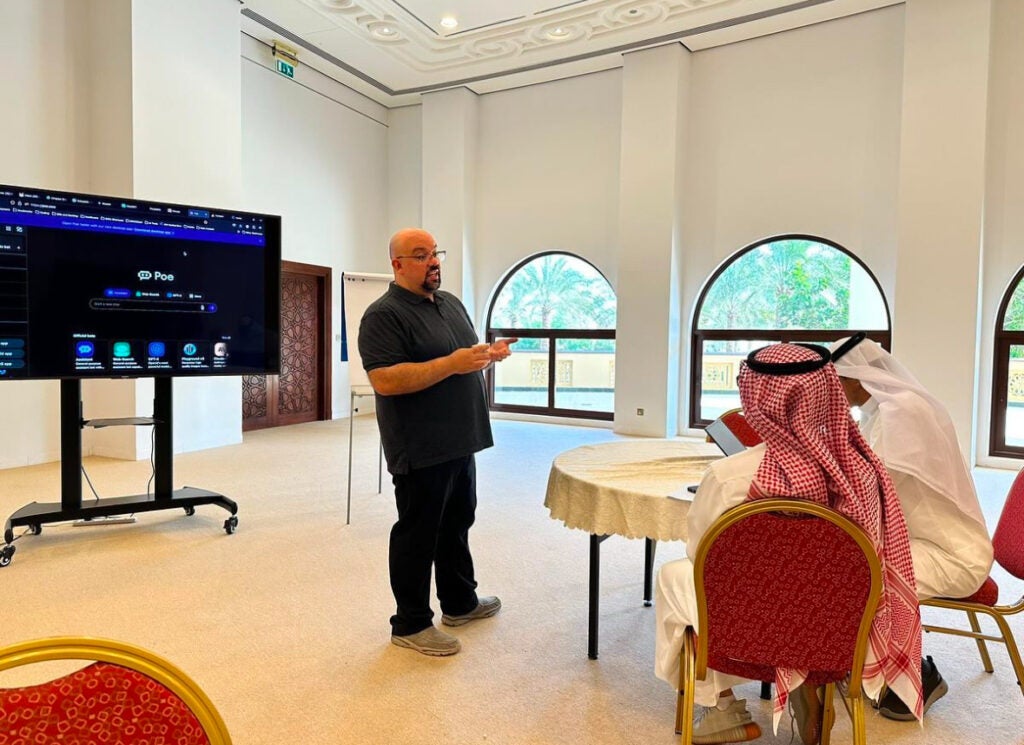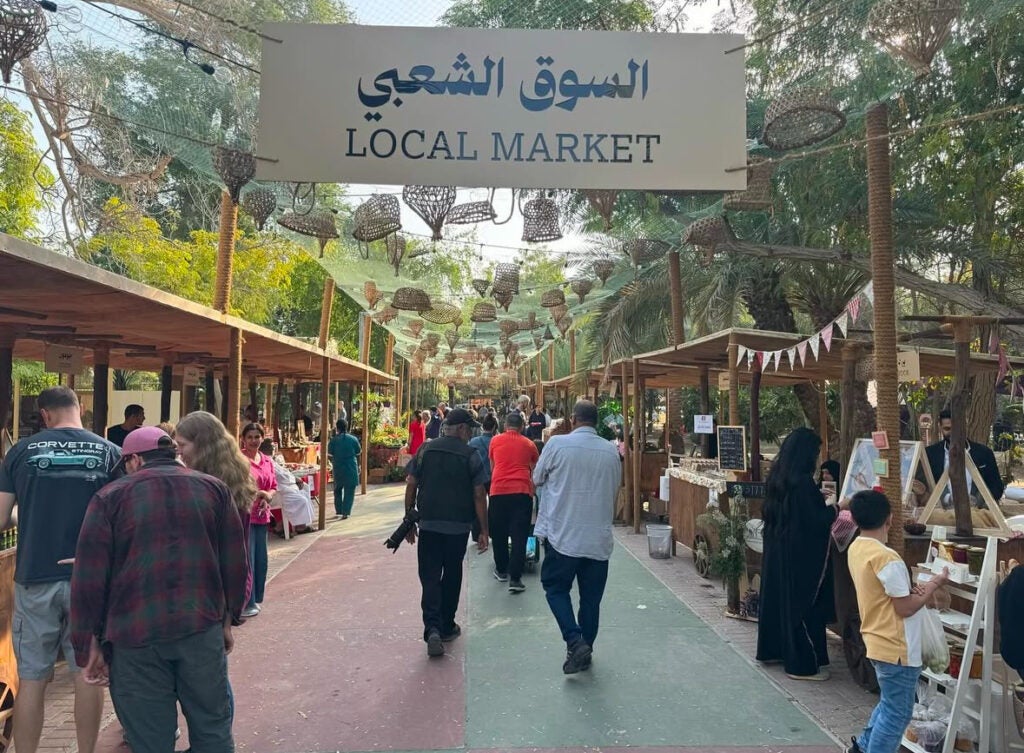During a 2024 multi-phase project in Bahrain, English Language Specialist Dr. Joshua Paiz began each of his AI Literacy sessions by addressing the elephant in the room: as a teacher, what concerns you most about AI in your classroom? “Many educators came into the workshops feeling overwhelmed by the rapid development of AI or worried that it might one day replace them in the classroom,” Paiz recalls. This approach — addressing fears before exploring the immense potential that artificial intelligence holds for teachers and their students — would set the tone for a transformative project reaching over 100 educators across the country.

Paiz’s project arose from a need identified by the U.S. Embassy in Manama. From teacher training institutions to vocational schools, educators were grappling with how to integrate these powerful new tools into their teaching practice. During both virtual and in-person engagements with local educators and project stakeholders, Paiz presented ideas for integrating AI into classroom practice while considering the ethical implications of this emergent technology. Speaking about the success of the project, Regional English Language Officer Kim Chilmonik noted Paiz’s familiarity with how AI tools are transforming the field of TESOL, a background that “underscore[s] his role as a trailblazing thought leader in a rapidly evolving technological and education landscape.”
Preparing for the Project
In preparation for the three-week, in-person workshop phase of this project, Paiz researched the priorities of Bahrain’s Ministry of Education and the unique challenges teachers face in adopting new technologies. This two-week virtual phase involved lots of listening and learning. The Specialist worked closely with Bahrain Teachers College, the Ministry of Education, and the U.S. Embassy in Manama to ensure the project goals aligned with local needs. Paiz focused on building a solid foundation in the first phase—starting with basic AI concepts—and then gradually layered in more advanced ideas in later phases.
Tools of the Trade: Flexibility and Responsiveness to Learners’ Needs
Paiz drew from his background in applied linguistics and computer science as he developed the workshops, but his approach changed quickly when he saw the specific writing needs of teachers in attendance. During the first workshop, teachers made it clear that rather than theoretical concepts for AI application, what they wanted were practical ways to utilize those strategies. “After that first day, we completely revamped the workshops,” he shares.
This shift meant showing teachers how to use AI tools for immediate classroom needs – from providing personalized writing feedback to analyzing student data for better instructional decisions. Teachers wanted context-specific and actionable ideas for AI use, which Paiz delivered throughout his workshops. The lesson learned? Being flexible and responsive is an essential part of being a Specialist. The extra effort paid off, as “those adaptations made the workshops stronger and more relevant, and it helped build trust and credibility with the teachers.”
The needs and familiarity with AI that audiences brought to the workshops varied across institutions, and Paiz’s approach to each workshop was tailored accordingly. At Bahrain Teachers College, discussions centered on AI’s role in teacher training and research to suit the more concept-driven expectations of educators. In vocational schools, where teachers were more interested in immediate use, the focus shifted to hands-on applications. In every case, the deliberate creation of a space for collaboration or discussion tied workshops together. Paiz emphasized the need for workshop participants to consider their own teaching contexts when taking in material and encouraged context-specific questions from all participants. “At the end of the day, it was all about meeting people where they were and showing them that AI wasn’t something intimidating or out of reach, but a tool they could use to enhance their teaching in meaningful ways,” he says.
Breakthroughs and Keys to a Successful Project
Through the workshops, teachers saw how they could utilize AI to create targeted lesson plans, adjust pacing, or even offer personalized interventions, making their teaching more responsive and impactful. But perhaps the most significant outcome wasn’t about technology at all — it was about community. “I aimed to create an environment where everyone could share their perspectives and grow together, fostering a deeper appreciation for our different yet interconnected educational landscapes,” Paiz says.
Looking back on the success of the project, Paiz identifies regularly assessing participant feedback, focusing on collaborative and interactive opportunities for attendees, and staying grounded in the skill sets he already possessed as the keys to his success. “Even if you’re venturing into unfamiliar territory, your foundational knowledge and skills will guide you,” he says. “Frame your recommendations in terms of what you know works well, while being open to adapting it to the local context.” Beyond these guidelines, tapping into local culture — perhaps by visiting mosques and farmer’s markets, as he did — is a good way to develop the trust and connection necessary to make an impact with learners.

There and Back Again
Paiz’s work continues to resonate well beyond Bahrain’s borders. Several months after the close of the project, at the TESOL 2024 convention in Tampa, Florida, he shared key insights from his experience — particularly strategies for addressing AI anxiety and fostering critical AI literacy — with educators facing similar challenges worldwide. This presentation was, in his view, “a chance to highlight the importance of tailoring AI training to meet the unique needs of language teachers and students, while also emphasizing the role of cultural context in shaping how technology is introduced and adopted.”
“In many ways, the Bahrain project has reinforced the idea that AI literacy is not just a technical skill but a cross-disciplinary imperative.”
Moving forward, the Bahrain project has become a bridge to even broader applications of AI literacy for Paiz. He’s discovering, for instance, that many of the principles developed during his workshops translate effectively to engineering education. The emphasis on practical, accessible strategies for understanding AI that he honed in Bahrain also works equally well with future software developers, who need both technical expertise and critical awareness of AI’s ethical implications. “In many ways,” he notes, “the Bahrain project has reinforced the idea that AI literacy is not just a technical skill but a cross-disciplinary imperative.”
Dr. Joshua Paiz is a teaching assistant professor of EAP at George Washington University, where he also serves as the cybersecurity and cloud operations advisor for the Writing in the Disciplines Program. He holds a Ph.D. in Applied Linguistics from Purdue University along with an MA-TESL from The University of Toledo and graduate certificates in Teaching Writing and Computer Sciences, along with professional certificates in Data Analytics, ELT Program Management, and Advanced Practice. Ever a lifelong learner, he is currently pursuing a second master’s in Applied Computer Sciences (MS-ACS) at George Washington University.
Dr. Paiz’s previous international experience includes delivering plenary addresses, workshops, and research talks in Ireland, Poland, Uruguay, Taiwan, and Cambodia, as well as teaching stints in mainland China at New York University – Shanghai and Wuhan University.
His scholarly interests in TESOL include a rather considerable background in diversity, equity, and inclusion, where he has been active since 2015 and has published several articles and book chapters, along with an edited collection and his first solo monograph. Recently, his work has shifted to explore the intersections of ELT and Computer Sciences. This has brought him to the topic of AI in ELT–the subject of two books under contract with the University of Michigan Press and Equinox, UK–and the application of natural language processing (NLP) and machine learning (ML) tools to address research questions in ELT and applied linguistics. When not busy, Dr. Paiz enjoys sewing, knitting, video gaming, and traveling (Japan, Singapore, Hong Kong, Great Britain, New Zealand, and Canada).
